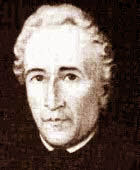Physicists, astronomers, architects, geometricians, mathematicians, chronometer-makers, watchmakers: these are just some of the interested people who, through the years, have displayed a passion for the measurement of time. Their research led to major discoveries and inventions that are still relevant today. Whether physical or geometrical theories, natural laws or mechanical applications, their fundamental contributions have all made it possible to measure time with greater accuracy, to create timepieces to ever higher specifications while allowing aesthetic qualities to become more refined, and even to design increasingly efficient and modern production methods.

Jean-Antoine Lépine
(1720 - 1814)
French horologist, inventor of the calibre that bears his name. The features of this calibre are the suppression of the fusee and the substitution of bars (bridges) for the upper plate and the pillars, which enables the balance to be placed on one side, and not on top of the mechanism, so that much flatter watches can be made. Lépine also claimed to have invented the virgule escapement.


 Knowledge
Knowledge